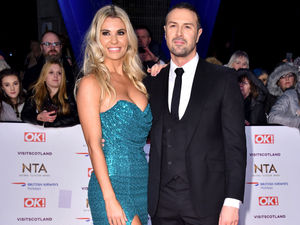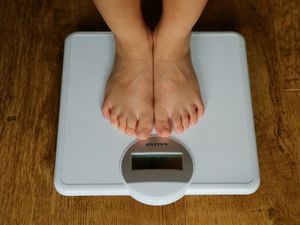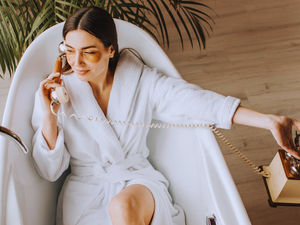Christine McGuinness on why carers are so important
Christine McGuinness and her husband Paddy shone a light on life with autism in their moving BBC documentary, Our Family And Autism. But making the programme, which aired in December, also gave McGuinness a glimpse into the vital role carers play for so many.

“I went to meet a lot of adults who had support, and it made me realise how important our carers are,” says the reality TV star and mum, who recently received her own autism diagnosis aged 33 after her three children – eight-year-old twins Penelope and Leo, and Felicity, five – were previously diagnosed.
Now, McGuinness – who grew up near Liverpool and married Top Gear and Take Me Out presenter Paddy in 2011 – is supporting the Department for Health and Social Care’s new ‘Made with Care’ recruitment campaign.
There are currently 105,000 vacancies in the adult social care sector. The campaign aims to highlight the positive and rewarding aspects to these careers, which don’t often get talked about. “Our carers really need to know just how important they are,” says McGuinness. “At some point we may all need care, or our parents or children, and it shocked me there were so many job vacancies available.”
After looking at existing job ads, McGuinness came up with her own version, describing a career ‘where the smallest act of kindness, support or encouragement can make a big difference to someone else… Where the most important part of your job is to enable the person you care for to live as independently as possible.’
After sharing it with her 649k followers on Instagram, McGuinness received a flurry of responses. “There are lots of carers all saying how fulfilling it is, how they love seeing the people they’ve supported, seeing how much they’ve come on. It’s such a rewarding job and that’s not being highlighted.”
It’s something she’s already witnessed in her own family too. “I’ve got a cousin who’s a paramedic, aunties that work in old people’s homes, a cousin that looks after a young lady with learning difficulties, and they are so important in those people’s lives. They all say they wouldn’t choose to do something else – it’s the most important job – and you don’t [need to] come from a very academic background,” McGuinness adds.
“For anything where you did need training, that would be available. But really you just need to be compassionate, to have patience, empathy. I think that’s a positive in going for these sorts of jobs because you don’t need all the paperwork to back you up, you just need to be kind and compassionate and caring.”
Carers often provide crucial respite for the wider family too. McGuinness agrees making space for self-care is crucial for anyone caring for a loved one. “And I think that’s just for anyone in general – we all know how important that is more than ever right now, to take care of ourselves,” she reflects.
“For me, I love exercise, anything from just going for a nice walk in the sunshine, getting a bit of fresh air, to lifting some weights in the gym. Just trying to stay healthy, stay active – I’ve got three young children, I need to try and stick around for as long as possible! Just trying to look after yourself, and asking for help when I need it.”
This is something she says she’s “definitely” got much better at since being diagnosed with autism herself. “I’m trying to be more honest about the way I think and feel, because I think that’s something I naturally tend to shy away from,” she shares. “I am very much a people-pleaser and just like to try and keep everyone happy and sometimes do things that aren’t necessarily for me – I just go along with everything to keep everyone happy. But now I’ll try and say, ‘Oh, it’s not for me that, I’m going to sit this one out’.
“It’s been really helpful with work,” she adds. “I was filming a show just before Christmas, The Real Full Monty, and it was the first time I’d spent the whole day at work with people I didn’t really know and that’s something I really struggle with. But because I was able to speak up about my autism, I was quite honest with them. I just sort of said during lunch time, ‘I don’t want to make myself a recluse and not include myself but I’m just going to take myself off for a little walk for 20 minutes and have a bit of quiet time, so I can come back and focus again’, because I just found it all a bit too much.
“Whereas before, I wouldn’t have done that, because I wouldn’t have wanted to make myself look or feel any different, so I would have just tried to get on with it and then would have been really exhausted by the end of the day. So it’s helped me being able to talk about it, being able to ask for help when I need it, that’s been amazing for me.”
A big motivation for McGuinness is modelling these things to her children. “That’s why I do everything I do, and why I talk about it. I try to lead by example to show the children that it might not always be exactly what they want to do, they might not want to go to that wedding or birthday party, that’s often how it is for me as well – but I want to show them they can do it,” she says.
“And for me as well, it’s been a kick up the bum to think, I can do things, I can be social – it’s just that often it doesn’t quite come naturally to us.
“But I want to show them that Mummy is doing this, Mummy can do it. I don’t want autism to ever hold them back.”
For more information on the campaign and how to apply for a job in care, visit adultsocialcare.co.uk




